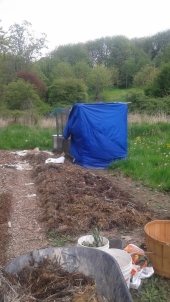
 7
7




New location. Zone 6b, acid soil, 30+ inches of water per year.
https://growingmodernlandraces.thinkific.com/?ref=b1de16
Growingmodernlandraces.com affiliate
 10
10





 8
8




Some places need to be wild
 6
6




Striving to grow things as naturally, simply, and cheaply as possible! 
My YouTube channel
 6
6




Steve Thorn wrote:Has anyone grown large bushes in the paddocks or run, for overhead cover from predatory birds and for cover that they could get in to hide from other predators?
Zone 9b
 9
9




"When the whole world is running towards a cliff, he who is running in the opposite direction appears to have lost his mind." C.S. Lewis
Visit https://themaineingredient.com for organic, premium dried culinary herbs that are grown, processed, and packaged in the USA.
 9
9





 1
1




I had a chicken tractor that I built last year but never used--it had skis on the bottom. I bet that would work as well.Gray Henon wrote:I lined the bottom of my chicken tractor with pvc conduit (uv resistant) then electrified the steel fencing on the tractor. It has worked well for many years.
New location. Zone 6b, acid soil, 30+ inches of water per year.
https://growingmodernlandraces.thinkific.com/?ref=b1de16
Growingmodernlandraces.com affiliate
 1
1




I don't think "free" chickens in the woods would necessarily be a bad thing. While that's not my goal, it's definitely something to think about for the future.Matt McSpadden wrote:Hi Lauren,
I think free range is a great concept, but I also don't know of anyone who does true free range chickens for long. Everyone always switches to something else due to the losses. I worry if you breed some chickens that are good enough to get away and live... you probably wouldn't find any eggs anymore :)
New location. Zone 6b, acid soil, 30+ inches of water per year.
https://growingmodernlandraces.thinkific.com/?ref=b1de16
Growingmodernlandraces.com affiliate
 3
3




I don't think "free" chickens in the woods would necessarily be a bad thing. While that's not my goal, it's definitely something to think about for the future.
"When the whole world is running towards a cliff, he who is running in the opposite direction appears to have lost his mind." C.S. Lewis
Visit https://themaineingredient.com for organic, premium dried culinary herbs that are grown, processed, and packaged in the USA.
 12
12




Come join me at www.peacockorchard.com
 7
7




You have to be tough or dumb - and if you're dumb enough, you don't have to be so tough...
 5
5




 9
9




 3
3




Bless your Family,
Mike
 6
6




Visit Redhawk's soil series: https://permies.com/wiki/redhawk-soil
How permies.com works: https://permies.com/wiki/34193/permies-works-links-threads
 5
5




 7
7




short films and small works on living regeneratively at http://appleturnover.tv
 4
4




 1
1




 7
7




We can take care of our small piece of this world. Leave no footprints.
 2
2




 1
1




Rachel Jones wrote:I read somewhere about making a fishing line net, running/weaving fishing line above the field where you want to let your chickens range for hawk protection. My guinea hens kept the neighbors dog at bay the other day, 50 guinea hens can make enough noise to disturb almost anything.




Bless your Family,
Mike
 1
1




I don't own the plants, they own me.
 1
1




 1
1




My tree nursery: https://mountaintimefarm.com/

|
There is no "i" in denial. Tiny ad:
Learn Permaculture through a little hard work
https://wheaton-labs.com/bootcamp
|



